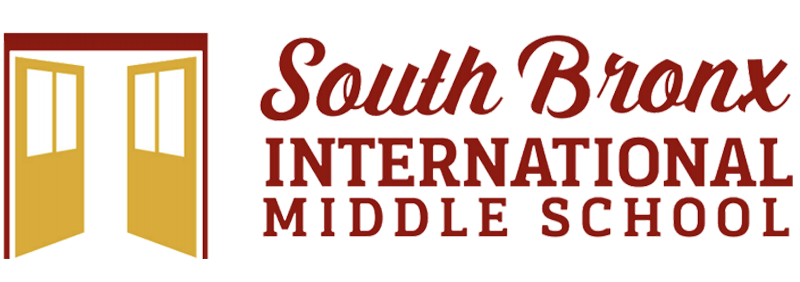Advisory at SBI
We believe there must be at least one adult in each child’s school who knows that child very well. Advisory makes that happen by providing each student with consistent interaction with an adult who serves as a mentor to the child each year. Each child must feel a sense of ‘belonging’ at school, and advisory is a critical component for that to happen. Each advisor at South Bronx International mentors about 12-15 students, and the Advisory group becomes a nurturing “family” within the school. Advisory meets five days per week for 50 minutes per day.
Each advisor at South Bronx International mentors about 12-15 students, and the Advisory group becomes a nurturing “family” within the school. Advisory meets five days per week for 50 minutes per day.
Advisory at South Bronx International has 4 key components:
● Mentoring and advisement
● Teambuilding & Community Building
● Social justice & Community Service
● Arts Integration
Mentoring and Advisement- The advisor’s primary responsibility is to ensure each student is thriving academically, socially and emotionally. We do not wait until weeks go by to find out that a student needs help catching up, rather we ensure that each and every student is keeping pace academically and supported emotionally by staying tuned in to our students on a daily and weekly basis. The advisor ensures that each student is on track, or if not, that the student gets the help s/he needs right away that week or the next week. If the advisor is unsure how to provide help, s/he looks to the team for support.
Student-Led Learning Cycle: Advisors meet with students and families periodically throughout the school year to facilitate student goal setting and to facilitate student written reflection and oral presentation on progress. This culminates twice per year in Student-Led Family Conferences. Students prepare for student-led conferences during Advisory.
Teambuilding/Community Building At the heart of our school community is caring relationships among students and between students and educators. Advisory helps students learn how to build a warm, close-knit, caring community while students read, write, and discuss current events, social justice issues, and other topics of interest to adolescents such as peer pressure and decision-making. Advisory is a forum for social-emotional learning and grappling with difficult issues in their lives, in our community, and in the world Advisory provides an emotionally safe environment and a support system in which students feel a sense of belonging.
Social Justice & Community Service Our students will participate in a service learning project as a team over the course of a year. Our partnership with the Center for Supportive Schools affords us with the opportunity to seek out partnerships that are meaningful to each advisory based on the collective interests of the group. We integrate restorative circles and restorative practices into our advisory, and provide our students with the opportunity to process and grapple with complex issues in a safe space.
Arts Integration Through our arts partnership with the DreamYard Project, students participate in weekly artmaking to explore the themes of advisory: knowing and loving myself and knowing and loving my community. The art component of advisory gives the group space to explore topics in a hands–on, creative way.
Responsibilities of the Advisor The advisor is a champion for every child in the advisory and approaches the child with unconditional positive regard. S/he ensures a safe, trauma invested space for the advisory:
● Advisory meets in a circle
● Norms are established and posted in the advisory (i.e., the use of a talking piece).
● Advisory routines have been established.
● Shared lessons are implemented with fidelity. When there is no shared lesson OR when there is a unique advisory need, the advisor creates their own advisory lesson. There is a plan for each advisory period.
● One-on-one and small group conferencing takes place regularly.
● Students are assessed on the HELLO learning targets.
● Family Communication: The advisor welcomes students and their families in the beginning of the year with a variety of positive interactions such as phone calls, notes, and/or hosting a potluck. As the school’s primary liaison with the family, the advisor provides updates to families on student progress, offers guidance and answers questions, and keeps parents informed on a regular basis and involved throughout the year. If an issue becomes complex, the advisor seeks out the team, the, dean, community school director, social worker or principal for support. If the child is absent, the advisor will make contact with the family and document that information/contact on JumpRope. ALL FAMILY OUTREACH AND CONTACT IS LOGGED IN JUMPROPE.
● The advisor takes an active role in behavioral support for their advisees. This can look like the advisor supporting the child in a mediation with another advisee, working with a child on a behavior tracker, or the advisor supporting the child to prepare for a restorative circle. Advisors communicate with families about the behavior that a child is demonstrating, and works with the child, the family and the team to correct the behavior.
● At-Risk List- Utilizing the mid-marking period at-risk list to reflect with students on their progress and to make a plan for missed work and unmet learning targets. The advisor will contact families to inform them of students’ progress and plan to make up the work, and check in with the student to ensure that the plan is enacted.
Advisors will update the spreadsheet as needed.
● Support for students in preparing for SLCs:
❖ Support with selecting work to present, writing the SLC script, and rehearsing
❖ Contacting families for scheduling SLCs
❖ Reaching out to subject teachers to support gathering SLC work
❖ Ensuring that students are engaged in high quality SLCs
**Liaising with the Grade Level Team to discuss advisees’ social emotional and academic progress, support needed and/or plan to make up missed work.
***Please note the DOE interpretation phone numbers: 855-249-9103 and/or 800-231-0288.
